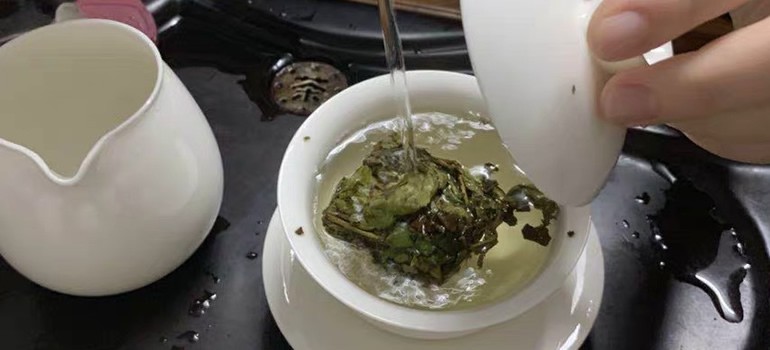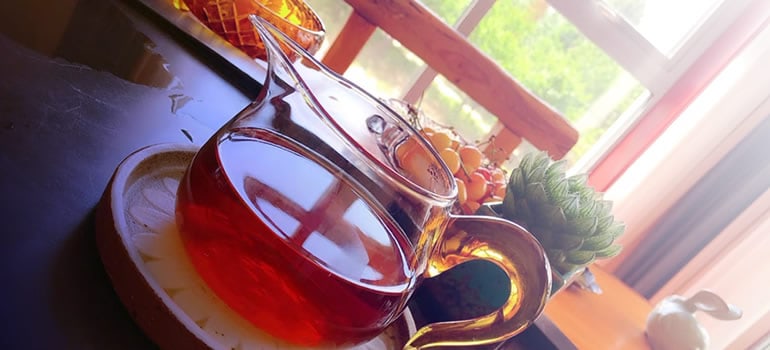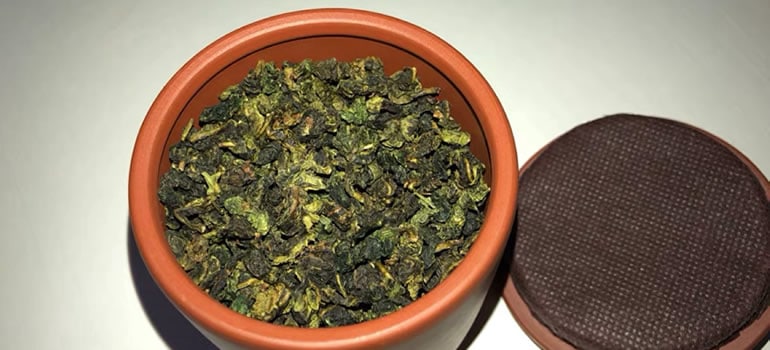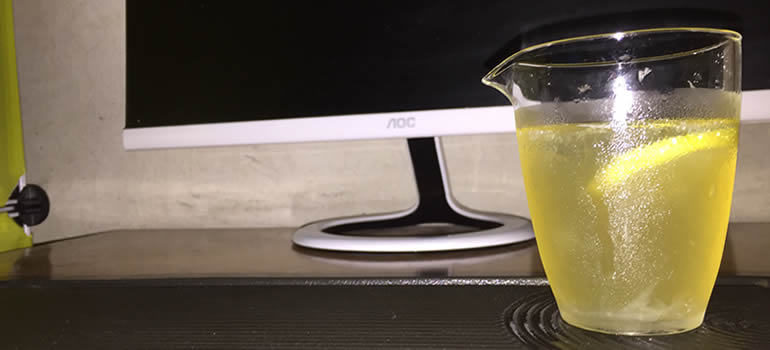Ginger is a plant.
But it is more known for its root. Ginger root has been used for centuries as a spice and in both traditional and alternative medicine.
Once you try it, you either love it or hate it. There is no middle ground. And once you taste it, you won’t be able to mistake its unique spicy and aromatic taste. Ginger is one of a kind.
Ginger is a powerhouse of healthy compounds as it seems to be packed full with many different nutrients, minerals, and vitamins.
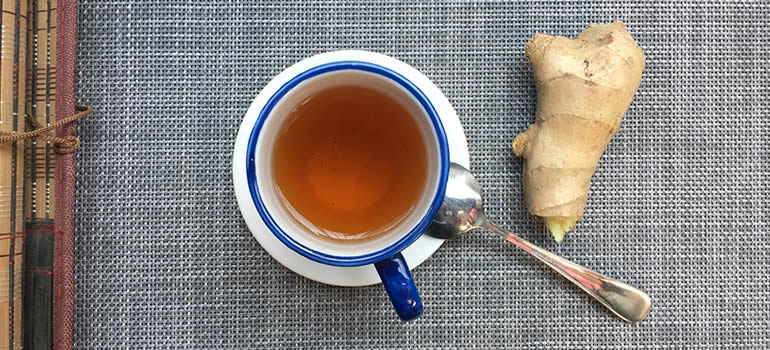
As you will find later on in this article, ginger tea can be used for alleviating many different health issues and so much more. But with that comes one question.
When is the best time to drink ginger tea? The best time to drink ginger tea is either in the morning or afternoon. The worst time to drink ginger tea is late in the evening. Ginger tea can stimulate the metabolism and bile secretion and combined with its spicy taste, and it may not be suitable for a late-night tea.
Of course, knowing when and how to drink ginger tea is important in reaping most of its health benefits.
Let’s take a more in-depth look at what outcomes you can expect from drinking ginger tea during the different times of the day, seasons of the year, and more.
What Is the Best Time of the Day to Drink Ginger Tea?
Although drinking ginger tea in the morning or evening will not alter in any way its properties, there are some things we need to be aware of.
I am saying this because drinking ginger tea during certain time frames of the day may evoke discomfort, so let’s take a look.
Can I Drink Ginger Tea in the Morning?
The best time to drink ginger tea is in the morning or afternoon.
Ginger is believed to really jump-start the food absorption and the rate at which your metabolism works. So this makes ginger tea a great drink to have after eating food early in the morning.
It is an excellent tea to have after breakfast, or lunch which is, generally speaking, considered one of the most important and significant meals of the day. And frequently the heaviest meals so our stomach may welcome the extra boost ginger tea provides.
When we think about what would be best to drink in the morning, a lot of people would first think of coffee.
However, tea is an excellent alternative to coffee. The right kind of tea should be able to wake you up and energize you without having to experience the adverse effects associated with caffeine consumption. What I am talking about, of course, is the energy crash after the effect of caffeine wears off.
Ginger tea may be able to do all of these without any of the negative consequences.
Can I Drink Ginger Tea on an Empty Stomach?
Ginger can stimulate your digestion and induce bile secretion.
Because of these qualities, ginger tea is not recommended to be consumed on an empty stomach.
If you happen to drink ginger tea on an empty stomach, make sure to eat something as soon as possible otherwise you may irritate or upset your stomach.
And a stomach ache is definitely not the best way to start your day.
Can I Drink Ginger Tea While Eating or After a Meal?
In order to avoid any digestive issues, the best time to drink ginger tea is while you are eating or right after you just ate.
Even modest amounts of food may help prevent ginger tea from causing abdominal pain and discomfort.
Is It Okay to Drink Ginger Tea Before Bed?
With so many people nowadays suffering from all kinds of sleep disorders, knowing what types of tea you should or shouldn’t drink before going to bed is incredibly important.
Tea can either alleviate or make things worse.
If you are looking for a tea to drink before going to bed – one that will not keep you wide awake the whole night – you need to make sure you don’t consume any of the ‘true’ teas.
‘True’ teas are the ones made from the Camellia sinensis plant. And the reason you don’t want them on your evening tea list is that they do contain varying amounts of caffeine. And black tea is the strongest and most capable of giving you quite the energy boost.
The other teas that contain caffeine are White, Green, Oolong, and there’s a few more.
Ginger, however, is considered an herbal tea. There is no natural caffeine content found in ginger. That is unless you are drinking a tea blend which may contain different tea types, which, on their turn, may contain caffeine.
Caffeine-wise this gives drinking ginger tea before bed a green light.
But not so fast!
Considering the muscle and mind relaxing effects of a nice and warm cup of tea in the evening – and the fact that ginger has no caffeine content – this can make ginger a great tea before bed.
However, ginger has a very distinctly astringent and spicy taste. It is also believed that spicy food can impede sleep and reduce overall sleep quality. Studies suggest that spicy food can reduce the total amount of time we sleep, and it also reduces sleep quality due to the raised body temperature.
Another case in point is that ginger is believed to stimulate and awaken the metabolism.
The combination of all of the factors mentioned above means that although some people may find ginger tea relaxing and sleep-inducing others may have a hard time falling asleep right after drinking it.
Of course, this is going to be highly individual and can vary from person to person.
If you notice any sleep disturbances or a drop in the quality and quantity of sleep you are getting try substituting ginger with other teas that have a proven record in aiding sleep (Like chamomile tea, for example).
What Is the Best Time of the Year to Drink Ginger Tea?
You can safely drink and enjoy a nice and warm cup of ginger tea during every season of the year. However, because of some particular qualities of ginger one season, in particular, is making it a must-have
The winter.
And the spring and autumn, for that matter.
The winter is the season where many people are more prone to getting cold or sick. Ginger has high amounts of vitamin C. Additionally, it contains various amounts of other vitamins and minerals like magnesium, iron, potassium, zinc, and more.
Ginger is known to promote sweating by warming up the body. This can relieve the symptoms of flu and cold.
In order to fully enhance ginger tea’s beneficial effects what we can usually do is add, honey, lemon, or even peppermint tea to it.
All of these can complement the taste of ginger really well depending on your personal taste and preference. Of these three, lemon is being the most commonly used ingredient in ginger tea because it adds a ton of vitamin C
Vitamin C has strong antimicrobial and antibacterial properties.
Other Occasions You Can Drink Ginger Tea
What you may not know is that ginger can be used for more than just relieving the symptoms of a cold.
In fact, it can help you with a couple more things.
1. Nausea and Stomach Problems
Ginger is commonly used for relieving nausea caused by both motion and morning sickness in women during pregnancy.
A great many people swear by its positive effects. So if you are suffering from nausea, this may be the best time to give ginger tea a try.
One study confirmed that ginger could be incredibly helpful to pregnant women. In the study, 28 out of 32 women felt a significant reduction of the symptoms of nausea after taking just 1 milligram of ginger a day.
Ginger has also shown positive effects on treating nausea caused by chemotherapy.
2. Menstrual Cramps and Pain
Women have been using ginger for a long time now for relieving the symptoms of menstrual cramps. And for many, it works like magic.
A popular blend that works well as a stomach ache remedy for some women is mixing ginger and peppermint. Peppermint tea is known to alleviate the symptoms of an upset stomach, just like ginger tea does. And combining them both together, we can end up having one really powerful pain-reducing cup of tea.
Another popular way to drink ginger tea is with a little bit of honey.
3. Muscle and Joint Pain
Are you experiencing muscle pain after working out?
Ginger can reduce inflammation. As such, it can be used to relieve joint and muscle pain.
Then ginger tea may be able to help. In one study, it was discovered that daily supplementation of ginger could alleviate the muscle pain by a quarter.
One study showed significant improvements in alleviating osteoarthritis pain as well.
4. High Blood Sugar
Ginger is believed to be able to regulate blood sugar levels.
In one study, researchers discovered that supplementing with just one gram of ginger powder three times a day reduced blood sugar in people who have diabetes.
Ginger was taken in addition to the medication the patients were taking. So ginger may be considered a great supplementation to the standard medication that is prescribed
5. High Cholesterol
High cholesterol levels have been associated with a high risk of developing cardiovascular disease.
Ginger may be able to help here too.
Research has shown that ginger can help in the reduction of LDL cholesterol levels and the increase of HDL levels. These are, respectively, the bad and good cholesterol. Thus reducing the chances of developing heart disease.
Is It Okay to Drink Ginger Tea every day?
You can safely drink a cup of ginger tea every day.
As we just saw, ginger is associated with many different health benefits: it fights pain, and nausea, reduces inflammation in the body and may improve our digestion, and so much more.
When you are drinking ginger tea, make sure you get fresh ginger. It is of better quality and almost always beats both powders and ginger tea bags.
With all that being said, it is important to note, that ginger tea and any other tea types for that matter, should be consumed in moderation.
Consuming too much ginger tea can lead to some side effects.
How Much Ginger Tea Is Too Much?
Overdosing on ginger by drinking ginger tea is going to be extremely difficult. Generally speaking, ginger is not known to have serious adverse health effects.
The rule of thumb is not to consume more than four grams of ginger a day. While in its fresh form you can technically eat a lot more than that, as a tea it will be quite difficult.
Consuming high amounts of ginger, due to its spiciness, can potentially cause stomach discomfort or heartburn.
In addition to that, ginger is known to have a few more effects on the body. It can lower blood pressure, and it can also act as a blood thinner, which may be a concern for people with bleeding disorders and lower blood pressure.
Side Effects of Drinking Too Much Ginger Tea
Although ginger can be considered a superfood. And ginger tea is every bit as beneficial as the ginger root is, we can stumble upon some side effects that may cause us some discomfort.
- Usually, ginger tea is safe for the great majority of people.
- Consuming too much ginger tea (especially in the evening before bed) can cause lack of sleep and overall feeling of restlessness throughout the night.
- Consuming high amounts of ginger may cause gas, nausea, heartburn, and diarrhea.
- Drinking ginger tea (or eating ginger root) on an empty stomach may cause stomach pains and discomfort.
In addition to that, certain groups of people are recommended to check with their doctor before consuming ginger tea on a regular basis.
- Ginger has blood-thinning properties and may be a concern for people that are on certain types of blood-thinning medication or have a history of bleeding problems.
- Ginger may lower your blood pressure which can lead to dizziness and lightheartedness in people suffering from low blood pressure. People that are working and have high-demanding jobs that require high levels of concentrations may have to avoid drinking ginger tea while working.
- Pregnant women may have to avoid the consumption of ginger tea (including, ginger water, and ginger root, too). There is a concern that ginger may lead to higher rates of miscarriage, or having a stillborn baby, although the evidence is not conclusive.
A word of caution: A lot of the data is either not conclusive or unreliable. And more research needs to be done, and until then, though, it is recommended to take extra care and consult with a medical professional before taking any types of foods or liquids for medicinal purposes, if you are on medications, or have specific health conditions.
Ginger Tea Vs. Ginger Water
On the first read, both of these may appear to be the same thing.
But are they really?
Ginger water is another easy and effective way to take advantage of the healing benefits ginger offers.
It is prepared by grating or cutting 1.5 teaspoons of fresh ginger root into slices or and boiling it in 4 cups of water for about 15 minutes.
Alternatively, you can bring the water to a boil and then add the ginger root and let it steep for 5 to 10 minutes. When ready strain the liquid and let it cool off.
A great many people like to add lemon after the ginger water cools off.
As you can see, it resembles a lot of ginger tea. Especially the latter preparation method. Which is coincidentally one of the ways people prepare ginger tea.
So both ginger water and ginger tea may, to a certain extent, be considered the same thing. It is just that ginger tea is consumed hot while ginger water can be consumed cold and it is usually prepared in larger quantities. And ginger water is made with fresh ginger root.
Ginger water provides the same health benefits ginger tea does although it may even be more concentrated than the tea so you may need to keep this in mind when drinking it.
Also consuming ginger water in high amounts on a constant basis will have the same side effects ginger tea has.

